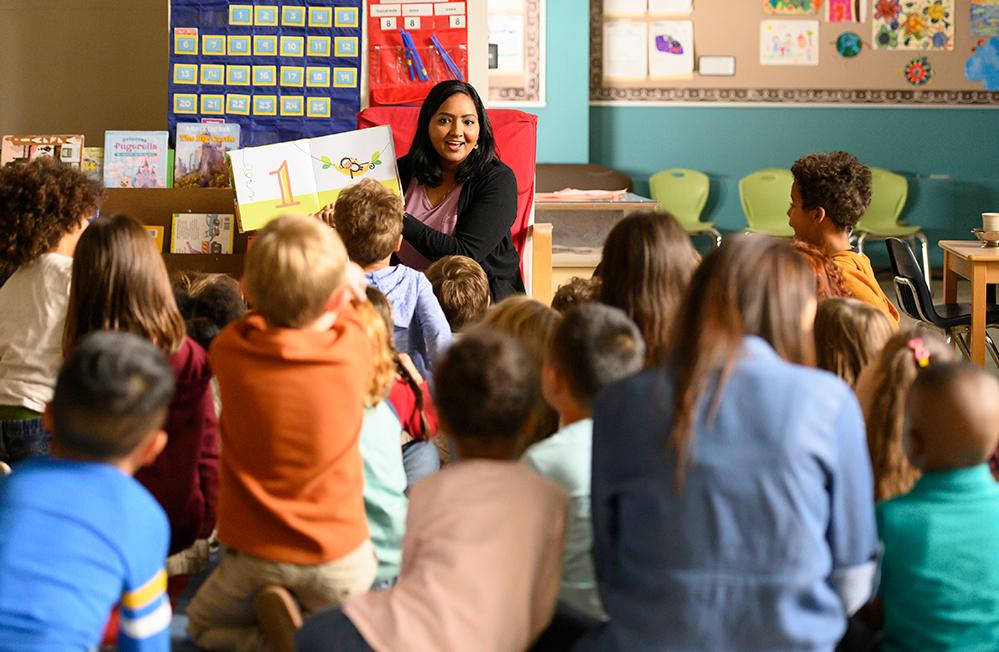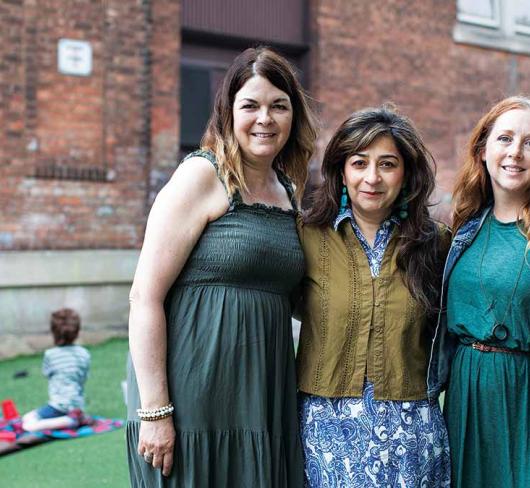
Little Children, Big Learning - Ontario's Kindergarten Program: A Success Story
The current learning model for Ontario’s Kindergarten program, with a certified teacher and a designated early childhood educator (DECE) working together, gives children and their families the start to school that they need.
Research shows that the partnership between a certified teacher and a DECE provides lasting benefits in reading, writing, numeracy, self-regulation and social skills, and it “has shown major results when it comes to children’s social, emotional and cognitive development.” (See Charles E. Pascal, “Full- Day Kindergarten – The Best of What We Imagined is Happening,” The Conversation, March 5.)
Ontario’s Kindergarten program was designed by education experts, and it has proven to be a successful learning program, a model for other jurisdictions to follow and a fundamental piece of our world-class education system.
The Teacher and DECE Team Make Kindergarten Work
The full-time certified teacher and DECE team is essential to the full-day Kindergarten program.
Teachers have a deep knowledge and understanding of the elementary school curriculum from Kindergarten to grade 8 and how the Kindergarten program expectations connect to later elementary grades. Teachers graduate from both university and a faculty of education program and are certified to teach by the Ontario College of Teachers.
Teachers know how to build on the foundation provided in Kindergarten and are responsible for student learning, long-term planning, effective instruction and formative assessment. Teachers have the ultimate responsibility for evaluation and formal reporting to parents.
Most people understand the importance of teachers in Kindergarten classrooms. Seventy-six percent of Ontarians agree that there needs to be a full-time teacher in every Kindergarten class.Most people understand the importance of teachers in Kindergarten classrooms. Seventy-six percent of Ontarians agree that there needs to be a full-time teacher in every Kindergarten class.
DECEs have knowledge of the developmental learning needs of young children. DECEs study early childhood development and focus on age-appropriate program planning, thus providing opportunities and experiences for children that contribute to the assessment of their learning. DECEs graduate from community college and/or university and are registered to practice with the College of Early Childhood Educators.
Seventy-one percent of Ontarians agree that the team of a certified Kindergarten teacher and DECE is important to the success of the program.
Kindergarten Works - Why Change it?
Ontario’s Kindergarten program works. The certified teacher and DECE each bring specialized knowledge and skills to foster the development and growth of every student. Together they build personalized relationships with individual children and focus on each child’s safety and well-being.
Despite all the evidence showing the program works, the Ford Conservative government is considering damaging changes to Kindergarten including the possibility of reducing or even eliminating the role of teachers in the classroom.
Maintaining and investing in the current Kindergarten program, including the fulltime certified teacher/DECE team, is critical to ensuring that Ontario’s youngest students get their very best start.
Reflections from a Kindergarten Team in Waterloo - Tracy Sims and Cheryl Yoworski
We are a Kindergarten team, teacher and designated early childhood educator (DECE), who have been working together for eight years.
As a team, our students benefit from the opportunity to learn with educators who are always engaging the children’s interests, supporting development and, in so doing, improving our own practice. With two educators addressing different aspects of the curriculum and the classroom environment, children have more access to a knowledgeable adult who can question, invite, extend or provide support. With the specialized expertise we both bring, we provide opportunities for children to develop, grow and be better prepared to enter the primary grades.
We embrace what it means to be a team and depend on each other throughout the day to best support our students’ learning. During our learning-centre time, when our students have an opportunity to explore different learning invitations, we have implemented a strategy where, if one educator is “down” and connecting with students or documenting their learning, the other educator is “up” to support the other students in their learning experiences, self-regulation and problem solving.
Research reminds us of the importance of building strong self-regulation skills during the early years. These will support a student’s ability to learn throughout the older grades. The current model of full-day Kindergarten provides children with the time and opportunities they need to grow, develop and learn in all the program areas.
The Kindergarten program is play-based, which provides multiple entry points for children. We can adapt or extend activities to ensure that each child is getting what they need socially and academically. When playing and experimenting, children don’t focus on finding “one answer,” but rather they are given the time and space to test out their theories. As educators, we scaffold and guide their experiences by asking questions to extend their learning.
When children enter and exit Kindergarten, they are at varying developmental levels in many different areas, but we are confident sending them to grade one after two years of rich programming. We know they have developed strong self-regulation skills that will translate into being able to learn more effectively in the later grades. We have also seen growth in their oral language skills, which benefits them as they transition to grade one and beyond in terms of their reading, writing and ability to communicate with others. We know that our program creates “thinkers” and allows young children to be creative and innovative and to take risks in their learning each day. These are essential skills for creating well-rounded and confident students for many years to come!
Young children benefit from the interactions with a teacher and an early childhood educator. We connect more and in deeper ways with the students in our room. The teamwork demonstrates to the children how to work with others respectfully and shows them that we can learn from one another. As an education team, we are able to provide them with more opportunities and more time to process when engaging in new learning.
We know from experience and from research that the early years are the most critical ones for children. Having a teacher and a DECE working together as a team provides the children with a positive beginning to their schooling. We are amazed by the growth we have seen in our students. They leave with a new-found respect for and confidence in learning. We are confident that our children’s growth is largely influenced by the partnership and supports provided in the classroom.
Our current Kindergarten model provides young children with the opportunity to experience success throughout their schooling. The Conservative government has suggested that changes to the model may be coming. It will take all our efforts to ensure that they do not undermine this important foundational learning.
Tracy Sims is a member of the Waterloo Region Teacher Local and Cheryl Yoworski is a member of the Waterloo Region DECE Local.
